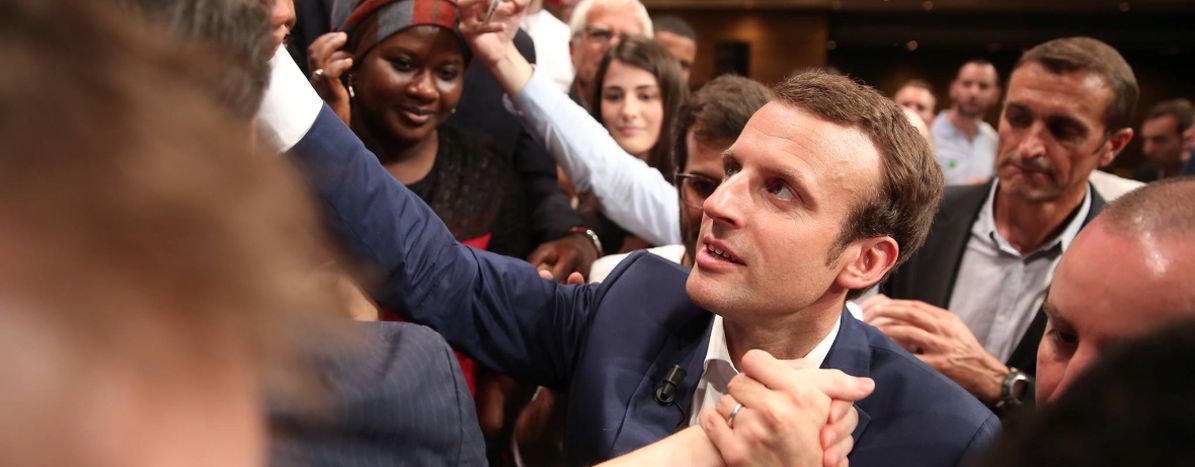
Can Emmanuel Macron save France from Marine Le Pen?
Published on
From Marine Le Pen to Donald Trump, recent months have been dominated by political outsiders. But is the youthful and indepedent Emmanuel Macron just enough of an outsider to become the next president of France? [OPINION]
Since the shockingly popular votes in the British EU referendum and the election of Donald Trump, the world is anxious to see what will happen to France. Late spring 2017 will see presidential elections there (as well as in Germany and the Netherlands) and hopes are high among European far-right parties like Front National (FN) in France.
Emmanuel Macron could not have predicted all of these circumstances, but he could not have picked a better time to run. His movement En Marche! [which translates to "Let’s go!", Ed.] was launched in April 2016 on a platform of "unblocking France" from antiquarian bureaucracy and unnecessary restrictions, while remaining faithful to the European Union - something which has proved wildly popular with younger voters. It may turn out that his timing and centrist message will be the unifying alternative for the French voter come April.
What happened, messieurs?
Marine le Pen officially launched her campaign on 5 February in Lyon. The preceding months had already seen her in rising favorability among the French population, reaching a current all-time high of 25%.
The FN's success can be almost entirely attributed to the fundamental failures of the incumbent Socialist Party (PS) and the Republican party. François Fillon, the formerly 'no-nonsense' conservative candidate, is battling allegations of misusing €1 million in public funds for his wife and family; making him a perfect target for Le Pen’s anti-establishment rhetoric. Meanwhile, François Hollande’s governance (and a historically low approval rating of just 4%) has safely catapulted the PS out of major French politics for the next few years. They are expected to barely match the Communists’ Jean-Luc Melenchon in the first round of elections on 27 April.
This has all played undoubtedly well into Le Pen’s hands, but those same circumstances also play into the hands of Macron. The independent candidate, who had, purposefully or not, been under the radar before January, is now being handed the baton to run the race to oppose Le Pen - but he will have to prepare for a tough campaign.
"En Marche!"
By the beginning of February 2017, En Marche! had amassed more than 170,000 members and roughly 21% in the polls in what Macron likes to call "their political insurgency." Few had expected the 39-year-old former economy minister to do so well so quickly. However, it was not only good timing that aided Macron, who has continuously convinced with regular TV appearances and impeccable rhetoric. His confident image despite a lack of a clear programme has led some critics to call him the French JFK. Yet, as possibly the last hinderance to a le Pen presidency, Macron may end up uniting France more than any seasoned French politician could.
The young, charismatic, and multilingual Macron has never been affiliated with a political party before starting "En Marche!". As the economy minister under Manuel Valls, he endorsed multiple liberal policies, such as the controversial reform to the loi travail. He believes to see France best to compete internationally from within the EU, while sticking to its socialist norms. He holds his own in hour-long debates and likes to provoke.
Macron has never been elected and therefore never had to campaign. But he has also never lost. This could possibly make him a very dangerous opponent to le Pen, since he is not actually part of the system she means to dismantle.
Macron runs his own anti-establishment speeches in frame with the En Marche! movement, remaining true to his capitalist-cosmopolitan vision of France. This wins him votes with the moderate conservatives and liberals without alienating the moderate left: something unheard of for a former Rothschild banker and a graduate of the prestigious Paris Nanterre University.
For the classic left voter, he still represents the deep division in French society between the political elite and the public. Macron likes to see himself as the unblocker of France and the face of political insurgence against the elite. But the newcomer has been called unauthentic (it recently came out that Macron spent a total of €120,000 trying to launch his campaign while serving as a minister), while his former boss Valls has called his movement "populism-lite."
At the same time Macron knows how to tease the classic left, as he did by announcing his run for presidency in Bobigny in the Parisian banlieues, where five years of PS government has done little to ease the inequality on outside Paris' front door. He advocates a more liberal approach to labor laws and businesses, while holding on to a social core; a position that might have mirrored that of Republican Alain Juppé (who lost the primaries to Fillon).
Macron would do well to keep up the role of provocateur until 27 April. The question is how long this "young and popular" status will keep him afloat as the cages of politics begin to surround him. So far, his movement has garnered hundreds of thousands of supporters and polls have been showing a hopeful belief in his candidacy. It is still not sure whether he will be able to take on the established parties in this lonesome run for the office.
Nevertheless, the French political climate is on his side. While Fillon is close to forfeiting, Le Pen has become a very electable candidate. Macron will possibly become the only alternative to the moderate voters in the second round. If then it comes to a second bid between Macron and Le Pen, he could garner both forces to win the presidency.



